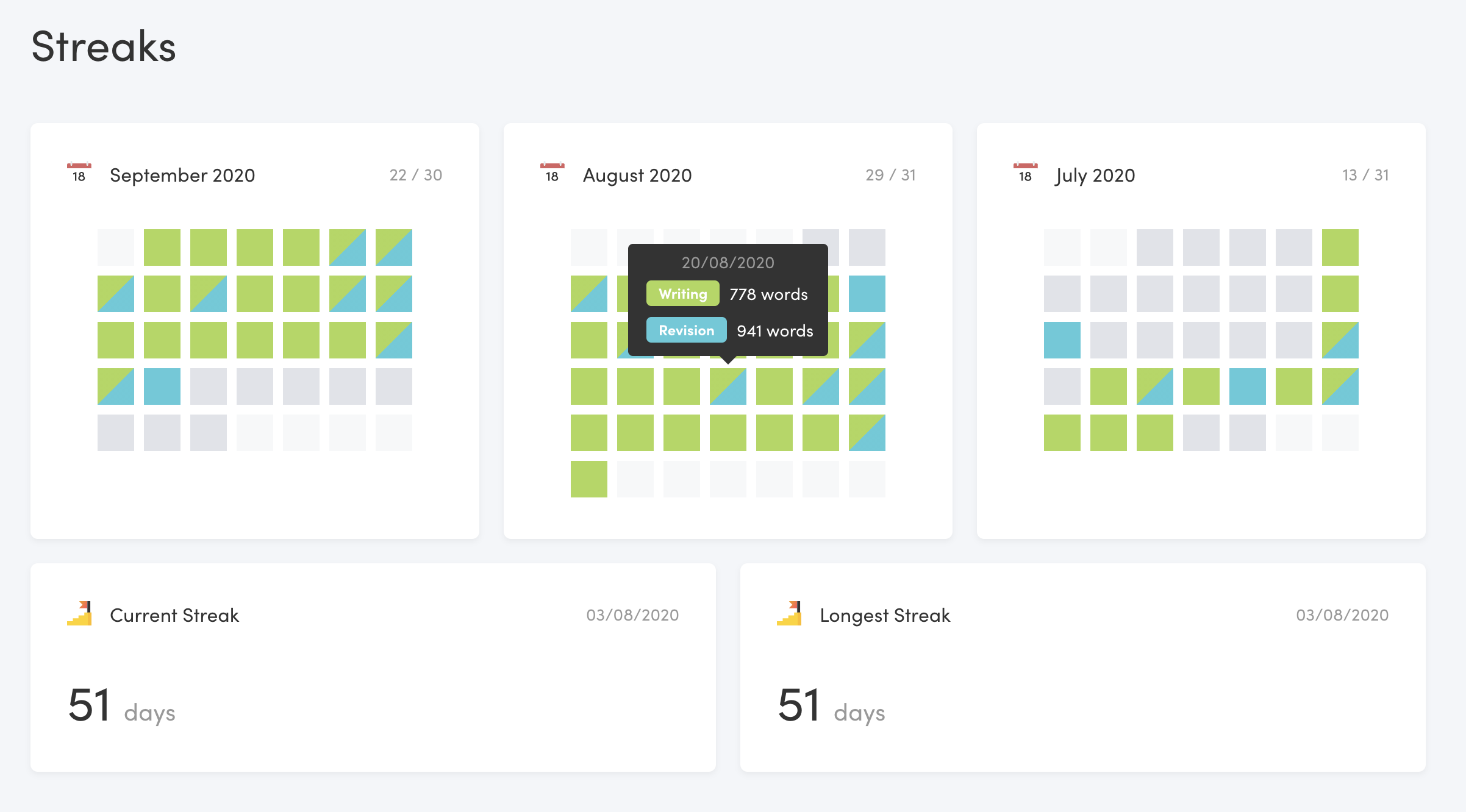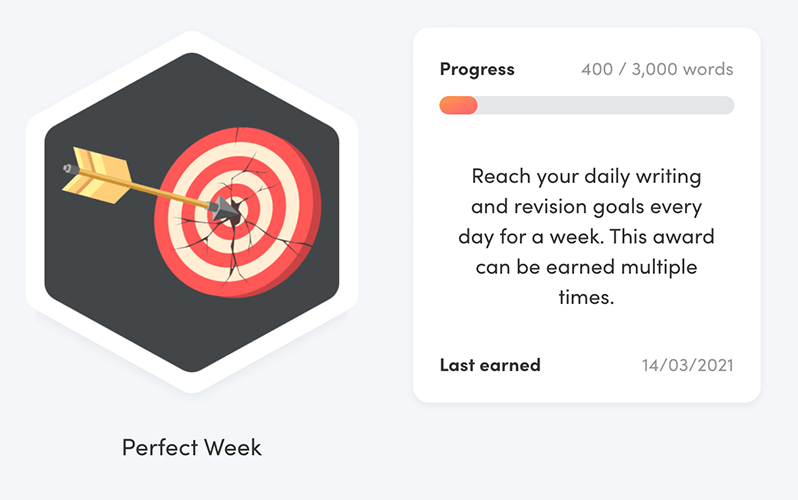How to Build an Unbreakable Writing Streak

A writer in motion tends to stay in motion. Momentum has a significant impact on your productivity. The more you write, the easier it gets. You'll feel more inspired and empowered. Over time, you'll develop a habit and make writing a part of your daily routine.
What most writers struggle with is building enough momentum so that they can reap those benefits. It's like learning to ride a snowboard. Steering becomes a lot easier when you're going faster. But convincing yourself to go fast down a mountain on a plank that you don't know how to stop is very hard.
Building a writing streak is a great way to start writing consistently and break through the initial resistance. In this post, you'll learn the do's and don'ts of writing streaks, and how to create one that will last.
What is a writing streak?
Writing streaks can last a set period or go on indefinitely. You commit to writing a certain amount of words every day during that time. The goal is to keep going for as long as you possibly can without breaking the streak.
Other variations of this method include the don't break the chain popularised by Jerry Seinfeld. Your only job is to not break the chain.
Writing streaks engage your competitive side. Sitting down to write becomes a bit of a game. How many days in a row can you get? Can you beat your previous score?
After you've built a decent streak (such as 10, 30 or 50 days), loss aversion comes in. You don't want to lose all the progress that you've made so far. If you break a two-month streak, it will take you at least two more months to build it back up.
Here are seven things to keep in mind when building your writing streak.
1. Set a low daily goal
The first mistake many writers make when starting to write every day is setting a high daily goal. Figures like 1,000 or 2,000 words per day seem great at first. Like that, you'll finish your book in just a few months!
You may be able to hit that goal for the first few days or weeks. But the first time you have a bad day, you'll very likely break your streak. For a lot of people, this can be extremely discouraging. If that happens multiple times, it'll make you feel terrible about your prospects as a writer.
Some days are 100-word days. Some days are 1,000-word days. There's no need to drive yourself to burn out over hitting an arbitrary goal on a day when you're just not feeling it.
Instead, consider setting a low daily minimum — like 100 or even 50 words. Write at least 50 words, and you get to keep your streak, but you don't have to stop there. On most days, you can keep going and write significantly more. And on days when everything goes wrong, you can write 50 words and go back to bed.
2. Schedule your writing sessions in advance
This may sound familiar: you wake up and start your morning routine. You want to write about 500 words on your project. Your inbox is full of emails that need sorting out, so you do that in the morning instead of getting your writing done. At work, your colleagues invite you to a team lunch. You don't want to refuse, so you skip your usual lunchtime writing session.
There's an accident on the motorway that adds an hour to your drive home. Then your partner reminds you that their parents are coming over for the weekend, so you spend the next few hours putting the place in order together. It's almost 10 p.m. when you finally sit down to write, but you end up binge-watching a bunch of YouTube videos instead. You're too tired to do anything.
Things come up all the time during the day. That often leads to postponing your writing sessions to later and later in the day. Writing when your eyes are closing to avoid breaking your streak isn't sustainable.
Schedule your writing sessions on your calendar the same way you would a meeting with a friend and give it an appropriate priority. You wouldn't ghost someone because something else came up.
Your calendar should reflect how important writing is to you.
3. Have a plan
Inspiration ebbs and flows. Sometimes, ideas are coming out of your ears. There are also days when you can turn your brain inside out and not find a single one. You should be prepared for both.
If inspiration strikes, feel free to work on a brand new idea. But what's the plan if it doesn't?
Have a rough idea of what you'll be working on before you sit down to write. This is easy when you're working on a book and have an outline. You take the next unfinished chapter and work on that.
When you're between projects or working on short stories and blog posts, keep a stash of ideas that you can work on when inspiration runs dry.
Some writers even keep a list of interesting prompts that they can explore in case they don't have anything else.
4. Track your progress
Writing is the definition of delayed gratification. Particularly when writing a book, you may be working for years before anyone else gets to read the story.
Your motivation will fluctuate. When it dips, it's essential to have systems and tools in place that will help you keep going.
Most writers use word trackers like Writing Analytics to track their progress and celebrate hitting important milestones along the way. It's also a great way to keep yourself accountable and see whether you're on track to hit the goals that you've set for yourself.
What sets Writing Analytics apart from other tracking methods is that it is completely automated. The built-in editor tracks words, time and several other metrics behind the scenes while you write. You can set goals and see the progress you're making on your dashboard.
The app is cloud-based, so you can use it on your phone, Chromebook or tablet and write wherever you are.

It comes with a built-in calendar that tracks your writing streaks for you. And when you reach a significant milestone, you'll get an award to celebrate.
5. Stay accountable
Many successful writers go to great lengths to get accountability. The traditional forms of accountability for writers include enlisting friends as accountability partners and joining a writing group. Online writing communities and masterminds (free and paid) have become increasingly common in recent years.
Writing a book is often an entirely self-motivated project. You're your own boss. If you never finish, nobody will know. Having someone to keep tabs on how you're doing can make you significantly more likely to show up and get your words done.
Showing up at your group's meeting week after week with nothing to show will get very awkward very quickly. Pretty soon, you'll be back at it again.
src/posts/how-to-build-an-unbreakable-writing-streak.md
Writing Analytics lets you share your dashboard with others. You can send the link to your friends, writing group and even share it with your audience. They will see your stats and how well you're doing against the goals you've set.
6. Keep the momentum going
No individual writing session is as important as the momentum you'll build by being consistent. You can always write more words tomorrow, but if you lose momentum, you'll get stuck. It can take a lot of time and energy to get going again.
Always strive to keep the momentum going, even if you make a mistake. It happens to everyone — nobody's perfect after all.
When you skip a writing day, do whatever is in your power to write the next day. Haruki Murakami has an interesting approach to writing books. When working on a novel, he never skips two days in a row.
James Clear, the author of Atomic Habits, explains it very well: 'Skipping one day is a mistake; skipping two is the beginning of a new habit.'
If you didn't write yesterday, get up earlier today. Or cancel your evening plans to make sure you'll have the time to write today. Never skip two days in a row.
7. Avoid burnout at all costs
Writing is hard. Add a full-time job or school. Maybe you run a business or are raising a family. A lot of times, it can feel like a grind.
When things aren't going well, many writers choose to double down. They power through until they run out of steam and burn out. Losing your streak is one thing. Burning out can be much worse. Just looking at the document with your project will stress you out. It can take months or even years to get back.
Writing is a marathon. Sprinting may get you ahead briefly, but you will lose in the long run. Make sure that whatever you're doing is sustainable. That's the only way to succeed as a writer.
Don't be afraid to reduce your daily word count for a while to ensure that you can keep the momentum going without grinding yourself down. When things clear up, you'll be in the best position possible to catch up and reach your goals.
Summary
Momentum is a critical part of any successful writing routine. It makes showing up every day easier over time. Use writing streaks to break through the initial resistance and build enough momentum to start the process. A writer in motion tends to stay in motion.









